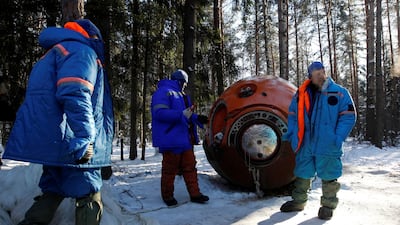The UAE’s first astronauts are to be sent on a gruelling mission in sub-zero Russian winter temperatures as part of the next phase of their preparation for space.
Hazza Al Mansouri, 34, and Sultan Al Neyadi, 37, who were chosen last year from more than 4,000 applicants to be the first Emiratis to undergo astronaut training, are currently taking part in a rigorous programme at the Yuri Gagarin Cosmonaut Training Centre, north-east of Moscow, Russia.
The next phase of that training will involve learning winter survival skills, which will be a key component of preparations for one of them to board the Soyuz rocket to the International Space Station in April.
The outdoor training will simulate what could happen if the capsule has to come back to Earth in an emergency and crash-land in a remote location.
“I was with the astronauts yesterday and they are preparing for winter survival training,” said Salem Humaid Al Marri, assistant director general for science and technology at the Mohammed Bin Rashid Space Centre, during a science education event in Dubai on Sunday.
"They will be left in a remote area with conditions similar to a Siberian winter and they will have to survive for two to three days on their own. This is a pre-requisite for any astronaut before they go on the Soyuz rocket.

Mr Al Marri said that while the astronauts would not have to travel to Siberia itself, temperatures will be at least as low as -10°C.
He also said that training directors are delighted with the progress the UAE astronauts have been making.
“They are doing great," he said.
"I have had meetings with our Russian colleagues and they said our astronauts are on a par with their American and Russian trainees.
“That shows us we have selected well.”
The two astronauts receive regular visits from family members to ensure their morale remains high and they have dedicated officers who are there to ensure their needs are met.
"I was with them and they are enjoying themselves, they are focused on their mission,” said Mr Al Marri, who also announced that the final choice of astronaut who will be the first Emirati in space will be announced soon.
________________
Read more:
Countdown to history: The inside story of how the UAE landed its first place in space
UAE astronaut candidates begin intensive physical testing in Russia
We have lift-off: UAE's Khalifa Sat to be launched into space
________________
The MBRSC Science Event 2019, which started on Sunday and ends on Monday, was launched to help future generations see the benefit of space exploration.
“When we started the MBRSC programme, it was not just about going into space, we wanted to go beyond that,” said Mr Al Marri.
“It is about educating the youth of the region about science and helping to create a knowledge-based economy.”
He said that he expected the event to help find the next generation of scientists in the UAE.
“We want to get young people thinking about embarking on a career as a scientist.
“Space exploration can create a lot of opportunities in all kinds of occupations, from lawyers to scientists, and we want to make people aware of that.”
At the event, Mr Al Marri also said that a MBRSC project in collaboration with Dubai Municipality to build a satellite to improve the emirate’s environment is now in "the final stages of manufacturing”.
It will be the first dedicated satellite in the region that measures greenhouse gas emissions.
"Nothing like this has been attempted in the Arab world before," said Mr Al Marri.
He said that DM Sat is currently scheduled for launch in early 2020.


